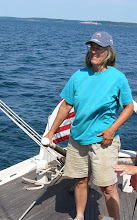Our Water Awareness Journey
I'll get back to the pellets and biomass soon. Right now while it's fresh in my mind I want to share observations of a cross country trip where we observed what happens when there is too much and too little water and people have made unwise choices regarding same.
The lake watcher headed west with her co captain and a crew mate from Wolcott a few days ago. Our first destination was the deep south where we became acutely aware of the impacts of too much water. We traveled from Mobile Bay west to the fabled French Quarter of New Orleans which largely escaped the rage of Katrina. Biloxi however did not. I had noticed the occasional groupings of live oaks around weedy plots as we drove the coast highway. When we neared the old gulf city of Biloxi these groupings became more frequent. Broken bleached snags and stumps marked the seaward median strip where once a complimentary row of oaks reached out over the highway to lace branches with the land side trees. We saw large multistory casinos with ripped and tattered siding exposing the steel beams beneath. A bill board touted Slab Removal 1.50 per square foot. We saw concrete street lamp bases still sprouting wires, bent and uprooted fire hydrants, and many many slabs with ragged live oaks and for sale signs usually listing a banking contact. It will be many years before Mississippi recovers from Katrina and its 25 foot storm surge.
Do you think that just maybe the banks might decide not to finance new mansions with waterfront views there?
The vital bustling colorful flavorful raucous French Quarter was largely untouched by Katrina. Humans are a resilient species and they're still busy trading and dealing and selling to the tourists in the Big Easy. We took a mule wagon ride ( mules stand the heat better then horses) with Daryl the guide and Willie providing pull. Before boarding I observed two notices taped to the seat backs. One had a three inch header PETA LIES the second with smaller print outlined the mule welfare guidelines of Willie's employer. He heads back to the barn when it hits 95 degrees. Daryl was a 22 year veteran of the tourism guide biz. He had been with his street wise mule for about 13 years.
Do you know where The Music was born? Not in the French Quarter. It was born in the Treme ( pronounced Trem-may). Daryl told us with pride in his voice. This, I now know, was one of the city's oldest neighborhoods where the free people of color lived. He also told us a well regarded producer had created an HBO series about the area and he had a bit part in one episode as a dancer. Later we had a beer and listened to three young black male musicians and a young white female vocalist wail out the blues. The waiter smiled and thanked me when I put a tip in the muscians' jar. The 99 % are still scrapping and scraping by in New Orleans. They even spare the tourist a smile and a cheery hello now and then.
Katrina largely spared the Lafitte swamp, too, but here we saw the first signs of drought. Crispy brown withered vegetation and dry bare earth lay beneath the tall straight Cypress trees and their knees. One tiny puddle of water under the boardwalk contained a dozen minnows. No alligators to our regret. But the treetops were busy with birds-winter warblers, sparrows, titmice and chickadees with an accent and slightly different plumage than New York black caps.
We stopped at the visitors center to inspect the restrooms and here a volunteer told us the swamp was under the influence of the great southwestern drought. But not to worry. The gaiters find holes, the turtles and fish repopulate, the birds go somewhere. But what the swamp can't deal with is giant Salvinia. This and a trio of other invasive south American plants how rapidly spreading through the bayous are weaving a choking mat of vegetation so thick you can walk on it in some places. You can't hand pull it- it takes a dredge and in five weeks it repopulates. A bit disheartened by this we moved on.
Next hydro fracking and a historic drought in the Permian Basin of west Texas.

No comments:
Post a Comment